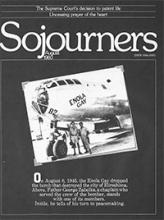'Love of money is the root of all evil." I heard these words paraphrased about six years ago while riding in the lurching jump seat of a truck-bus in rural Central America. The driver matter-of-factly had launched into a monologue about how much of a problem I was--not very nice words for a hired hand to say to a moneyed tourist.
"You rich Americans came down here and messed everything up. Just ten years ago, everybody was poor but we shared our stuff and were happy. If some lost their food or were sick, others helped out no matter how little they had to share.
"Now it's different. We're still poor but nobody shares with nobody, and some starve. No one's happy. There's stealing and fighting and killing and hating and everything."
I got quite uncomfortable. It didn't seem right that I had a future so different from his--one that corrupts his own lifestyle and hopes.
I thought of him the other day as I watched TV news of Latin American refugees beaching their dinghy in the middle of some sun-bathers lolling on Miami's shores. Our futures were coming together after all.
The recent influx of Cuban and Haitian refugees may well have done the cause of the gospel in the U.S. a mighty service. If there is anything that we in the U.S. should learn from their arrival, it is that our economic lifestyles are utterly sinful.
Much as we'd like to, it is becoming harder and harder for us to ignore the growing gap between rich and poor in our world. News coverage of global suffering, journeys abroad, and occasional eruptions in America's own pockets of poverty jar the tranquility of our wealth. But by far the most troublesome reminder comes when refugees cross our borders looking for a share in the good life.
Read the Full Article

